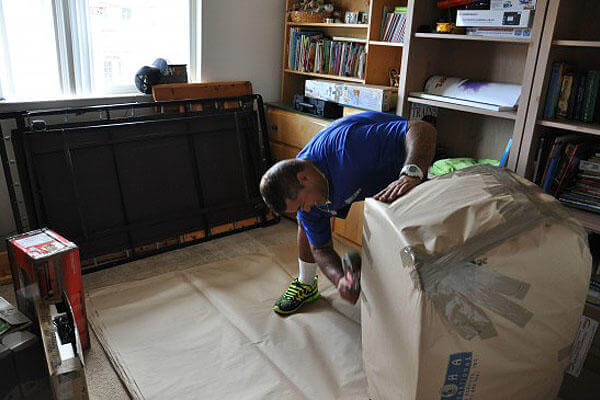SCHOFIELD BARRACKS, Hawaii - The Greek philosopher Heraclitus said, "The only constant is change."
To which Army wife Estelle Hunt adds, "You never get used to it."
Estelle and her husband, Staff Sgt. Todd Hunt of the 25th Infantry Division Band, received 30 days notice to PCS, or to make a permanent change of station move.
Todd is PCSing, unaccompanied, for a year in South Korea. Estelle and their four children are relocating to Washington state, which is where Todd will be stationed once he completes his mission in South Korea.
This isn't the first time the Hunts have had to PCS, and Estelle is handling the move like a pro. She has two of her children at a Boy Scouts camp, so they are not underfoot. Her other two children are out of the way in a bedroom watching television. She has a mental list of all of the things she needs to do: Clean the house, book hotel rooms, keep track of the movers.
In the middle of all of this, she even finds time to hand the author of this article a pen to take notes.
"I am stressed," she admits with a laugh. "Yes, I cry myself to sleep. Yes, I take long showers, but after awhile, you realize you just have to deal with it. The movers are here with their truck; you have to go. You pull your big girl pants up and dig in.
"It helps to remind myself that somebody always has it better and somebody always has it worse," she added. "I've had to PCS where I had a whole year to prepare. Then again, I've heard of people who had to move in two weeks. You need a back up to a back up to a back up plan."
Maintaining a sense of humor is also a must. That's her husband's job.
Or as he put it, "I'm out of my AOR (area of responsibility). This is a Household 6 and part of (Estelle's) AOR. I'm out of my lane here."
Then he dutifully picked up a broom and started sweeping debris tracked in by the movers.
If the Hunts have demonstrated anything, it's that a positive attitude and an ability to roll with the punches may be more important than any list of PCS tips.
That said, what follows are some basic PCS tips from the Military One Source website.
Important PCS Paperwork
ORDERS. Keep your original set of orders with you at all times. Having more than one copy with you is also a good idea.
IDENTIFICATION. Military IDs, driver's licenses, Social Security cards, passports and birth, marriage and naturalization certificates may be needed immediately by various organizations upon arrival.
VEHICLE DOCUMENTATION. If you're driving to your destination, your vehicle title or lease information and proof of vehicle inspection, registration and insurance are a must.
FINANCIAL INFORMATION. For security purposes, personal checks, any hard copies of recent bank statements, and credit and debit cards should travel with you.
HOUSING INFORMATION. Carry the household inventory that your moving company provided, as well as contact phone numbers and lease or mortgage paperwork.
LEGAL DOCUMENTS. Any applicable documents, like divorce or annulment paperwork from a previous marriage, wills, custody or adoption paperwork, and any powers of attorney should travel with you.
SCHOOL OR EMPLOYMENT RECORDS. Carry any transcripts, report cards or grade sheets that your children may need for school registration. You or your spouse may need transcripts, a current resume and letters of recommendation to look for or begin employment after a move.
MEDICAL AND VACCINATION RECORDS AND PHYSICIAN INFORMATION. Previous medical and dental records should be submitted to new physicians and dentists, and vaccination records will likely be needed for school registration and for some employment.
Prepping Children and Teenagers for PCS
Go to the installation youth center. Whether or not your child wants to hang out at the Youth Center, visiting will let you know what activities are available.
Become an active member of the installation community. Participate in family activities, clubs and other recreational activities to meet other families.
Encourage your teenager to find a part-time job. If you move during the summer, a part-time job will keep your teenager busy and provide a way to meet people.
Locate youth programs. Learn about the local Boys & Girls Club, the 4-H Club, YMCA or other youth programs. The military and family support center can help you locate them.
Look for opportunities in the religious community. Find out if the military chapel or other faith organization has an active youth group.
Tap into the service member's network at the new command. Ask co-workers and neighbors what their own children do for fun.
Pets and PCS
Research the pet policies at your next duty station. Some destinations, like Hawaii, have strict regulations and quarantine requirements, which may spell a longer (and costlier) preparation process.
Double-check that all veterinarian certifications are in order. Use a military vet, if possible, as they are more familiar with the paperwork required for PCS moves.
Call the airline or go online to find out about any flight restrictions your pet may face. For example, some airlines impose a "pet embargo" at certain times of the year on dog breeds that have respiratory issues due to the structure of their face. Many airlines also may limit the number of pets on each flight, whether they are flying with passengers or in cargo.
Crate-train your pet. Also, be sure your crate fits on the plane, is correctly labeled and has your name, your pet's name and your destination address clearly written on it.
Shipping Vehicles for a PCS
The government will ship a typical family car, but may not ship your recreational vehicle or a large truck with a heavy camper shell. There are weight restrictions, as well as restrictions on certain types of vehicles.
Modified vehicles. Low riders, lift kits, upgraded speakers and other non-factory modifications must meet special requirements to be shipped. The regulations vary by country, so be sure to check with your relocation office for information specific to your new duty station.
Time limits. There are strict time limits governing how late after your departure or before your return your car can be shipped. These limits vary by service branch.
Don't plan on moving extra household goods in your car. There are strict regulations on what may be placed in the car, as well as weight limits on the vehicle.
Depending on the country or state of your new home, you may have only a short time to license your vehicle after you arrive. Be aware of the regulations. You can find information about licensing your vehicle from the relocation office.
Buying a car at your destination. If you are a two-car family, you may choose to buy a car after you arrive at your new installation. Be aware that some vehicles in foreign countries -- even those made by American companies -- may not be legal to drive when you return to the United States.
For up-to-date information about shipping your vehicle, visit the Defense Personal Property system at move.mil. For more on shipping your vehicle overseas, see this Military.com article.













